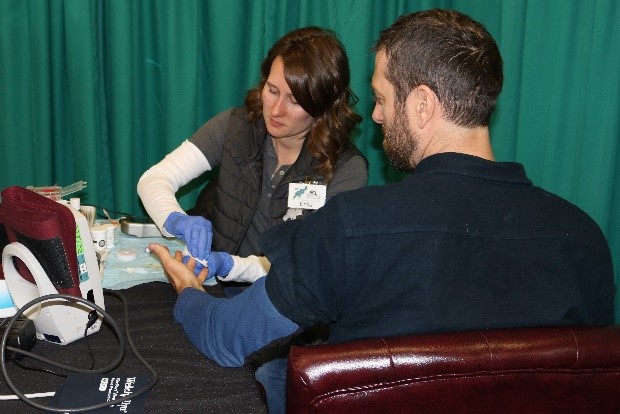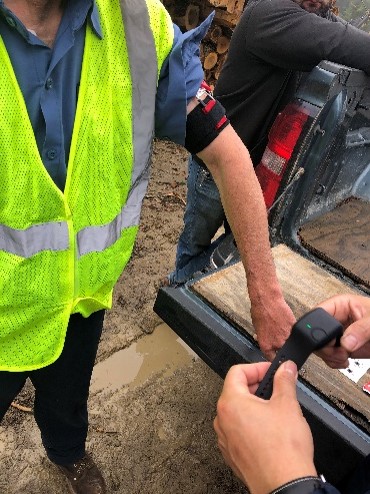Logging Mechanization and Impacts on Health
Posted on by
While logging is still considered a high-risk industry, the mechanization of work has contributed to critical safety improvements. When at one time most loggers performed manual felling, today a logger’s workday is increasingly spent seated while operating heavy equipment. There is no doubt that mechanization has changed the industry in many ways.
Researchers at the Northeast Center for Occupational Safety and Health in Agriculture, Forestry, and Fishing (Northeast Center), one of twelve funded NIOSH Centers for Agricultural Safety and Health, have been working with loggers across the Northeast to understand today’s health and safety concerns. Information has been gleaned from the Maine Logger Health and Safety Study, a longitudinal cohort study of hundreds of loggers.1 Additional insights were gathered from interviews with loggers in New York, Pennsylvania, and West Virginia during a pilot study.
Health Risks Associated with Mechanization

The Maine Logger Health and Safety Study included a sub-study involving health assessments.2 These assessments included a provider health exam and joint assessment, vital signs, peak-flow (lung) testing, audiometry, cholesterol and glucose screening and carbon monoxide screening. Of the 75 loggers who participated, 97% were men and the mean age was 46. This comprehensive evaluation, which was conducted in pop-up clinics in logging company garages, revealed that eight out of ten loggers had high blood pressure at the time of the screening and nearly half of loggers screened were in stage 2 hypertension. Additionally, the average body mass index (BMI) was 30.6 kg/m2. According to the CDC, a BMI of 30 or greater is considered obese.
These trends were echoed by loggers across the northeast during interviews. Many of the loggers we spoke with noted that weight gain as a result of spending all day in the cab was one of their most important health issues.
“…mechanized, you know versus manual…A lot of those guys are way overweight. I have friends that are fully mechanized and they went from, like me, 20-25 pounds overweight to like 100 pounds [overweight].” – New York Conventional Logger
“I mean, I was in way better physical shape when I was running the chainsaw. You know, you kind of get soft sitting in the machine all the time, so in that aspect, I miss the physical activity” – New York Logging Equipment Operator
“… these mechanized machines are nice. But you sure don’t get any exercise, you know? And I noticed that. So yeah, I think whenever [I’m] cutting with, you know, chainsaws and cable skitters, you got all kind of [physical activity]. You’re fit, felt good, slept good, you know, ate good. And now, I mean, you sat there all day, you know, pulling levers and pushing buttons.” – West Virginia Logging Equipment Operator
Chronic health concerns were an important result of this study, as many previous research efforts focused on injury and musculoskeletal disorders among this working group.
Health Insurance Coverage
The increasing focus on chronic disease was a driver to also explore health insurance coverage. When assessing traumatic injury trends in the Maine Logger Health and Safety Study dataset, researchers found that loggers still experience serious and at times disabling injuries, even as equipment operators. Further, this research showed that not having health insurance was related to an increased risk of injury.3
The interviews and interactions with logging business owners make it clear that it is not a lack of wanting to offer quality health insurance coverage to employees. Some have lamented that their inability to afford such benefits actually negatively affects their ability to retain well-trained employees.
“[Name redacted – a former employee] [left] and he wanted more money and bigger things and insurance and stuff so he wanted to go work for a bigger company.” – West Virginia Logging Contractor
“…some people might want to provide health insurance, which is kind of hard to do and too costly to do.” – Pennsylvania Logging Contractor
“…they don’t have access to [health insurance]. Oh man, like health or health resources or even Yeah, proper [benefits] like sick time or you know.” – New York Logging Equipment Operator

Conclusion
The Northeast Center is committed to working with the logging industry to address these health concerns. A health-focused curriculum was developed and delivered to nearly 700 loggers in Maine in spring of 2022. Additionally, the center collaborated with the University of Connecticut/Center for the Promotion of Health in the New England Workforce (CPH-NEW, a TWH Center) on a wearable blood pressure measurement field trial with loggers.4 Finding a way to address the gap in health insurance coverage and addressing chronic disease among this occupational group is the next focus. Logging is a vital part of our economy and has a rich heritage throughout the entire country. Let us put the focus on the industry’s most valuable resource: its people.
Erika Scott, PhD, is the Deputy Director of the Northeast Center for Occupational Health and Safety in Agriculture, Forestry, and Fishing, part of the Bassett Healthcare Network based in Cooperstown, NY.
Madeleine Zenir, BS, is a Research Coordinator with the Northeast Center for Occupational Health and Safety in Agriculture, Forestry, and Fishing, part of the Bassett Healthcare Network based in Cooperstown, NY.
Jennifer Lincoln, PhD, CSP, is the Associate Director of the NIOSH Office of Agriculture Safety and Health.
Kitty Hendricks, MA, is a Research Health Scientist for the NIOSH Division of Safety Research and the Assistant Coordinator for the NIOSH Agriculture, Forestry and Fishing Program.
See the other blogs in this forestry series:
COFE – The Future of Forest Operations
Job Satisfaction in the Logging Industry
Perspectives on Forest Operations Safety
The findings and conclusions in the blog posts are those of the author(s) and do not necessarily represent the official position of the National Institute for Occupational Safety and Health, Centers for Disease Control and Prevention.
Posted on by

